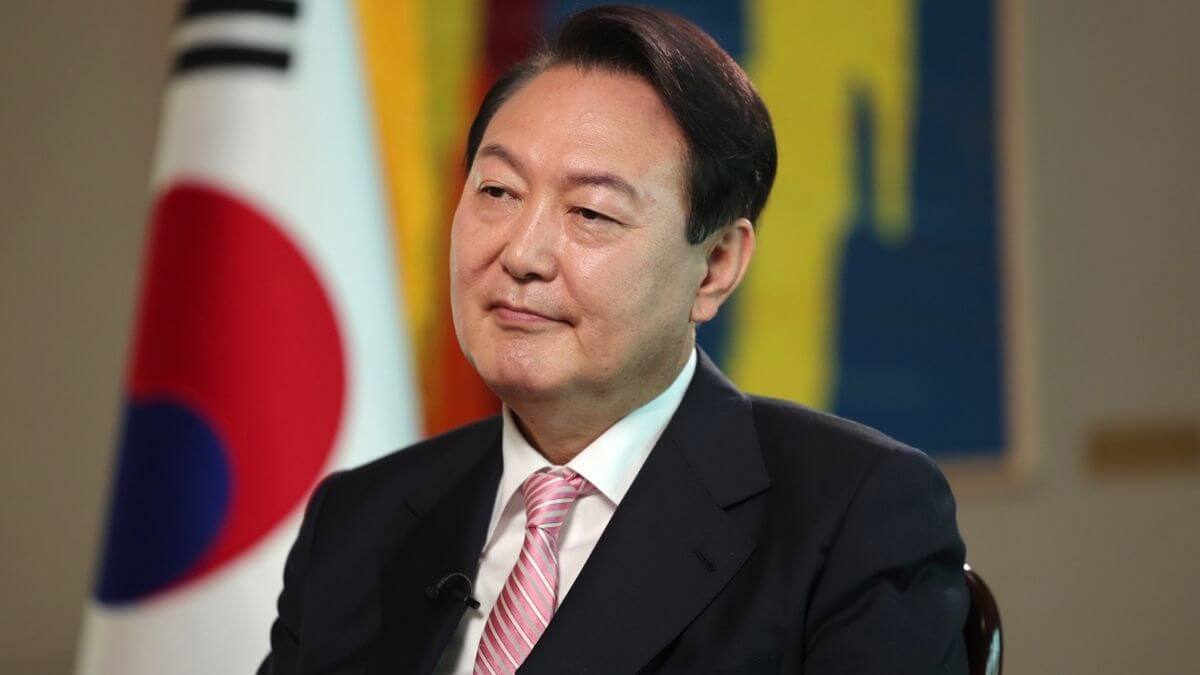In a speech celebrating the 77th anniversary of the Korean Peninsula’s independence from Japanese colonisation, South Korean President Yoon Suk-yeol offered North Korea a “large-scale” economic package if it agrees to suspend its nuclear programme.
Yoon argued that North Korea’s denuclearisation is “essential for sustainable peace on the Korean Peninsula, in Northeast Asia and around the world.” In this regard, he announced that his “audacious initiative” would “significantly improve North Korea’s economy and its people’s livelihoods in stages.” He stressed, however, that Pyongyang must “cease the development of its nuclear programme and embarks on a genuine and substantive process for denuclearisation.”
Further elaborating on the assistance package, Yoon said that South Korea would “implement a large-scale food program; provide assistance for power generation, transmission and distribution infrastructure; and carry out projects to modernise ports and airports for international trade.” “We will also help enhance North Korea’s agricultural productivity, offer assistance to modernise hospitals and medical infrastructure, and implement international investment and financial support initiatives,” the president added.
The United States, South Korea and Japan participated in a ballistic missile defense exercise off Hawaii's coast last week, the Pentagon said, reviving combined drills with an eye on North Korea as well as China https://t.co/qNptoxvlq3 pic.twitter.com/c8GalNXYWR
— Reuters (@Reuters) August 16, 2022
Welcoming news of the offer, United States (US) State Department spokesperson Ned Price said during a press briefing on Monday that Washington “strongly supports” Seoul’s “aim to open a path for serious and sustained diplomacy with Pyongyang,” as it is their “shared goal” to achieve “complete denuclearisation” on the Korean Peninsula He also assured that Washington would “continue to coordinate closely with the Yoon administration to this end.”
Price added that “a robust and effective trilateral relationship” between Japan, South Korea, and the US is “critical” for their “shared security” and that the three would jointly work towards “strengthening the global nonproliferation regime and bolstering the rule of law in the Indo-Pacific.” Like Yoon, he also underscored that the US would not remove any sanctions unless North Korea indicates that it is “interested in diplomacy or dialogue.”
Price’s comments come against the backdrop of South Korea’s defence ministry confirming on Tuesday that its military is set to resume the long-suspended live field training during its joint military drills with the US, which will be held from August 22 to September 1. The two allies have toned down on their military cooperation in recent years due to the COVID-19 pandemic and to reduce tensions with Pyongyang.
Had a useful dialogue with @antonioguterres, exchanging our views on situation on the Korean Peninsula as well as regional and global issues. Looking forward to seeing you again. pic.twitter.com/CrgXG9g5pl
— President Yoon Suk Yeol (@President_KR) August 12, 2022
The secretive regime has previously warned that military drills between South Korea and the US undermine prospects for improved ties between Seoul and Pyongyang. It has also alleged that such drills are designed to prepare for an assault on North Korea, claiming that the US is determined to achieve this “long-cherished desire.”
Kim Jong-un’s administration has warned that such moves “will only bring about catastrophic consequences of self-destruction.” Moreover, Pyongyang has accused the US of being “hell-bent” on military cooperation with its “stooges” to “contain rivals” such as China and Russia and “gratify [its] wild ambition for world domination.”
Crucially, North Korea has firmly indicated that it has no plans to halt the development of its nuclear programme. On Sunday, the state-owned Korean Central News Agency (KCNA) slammed United Nations (UN) Secretary-General António Guterres for expressing “full support” for North Korea’s “complete, verifiable and irretrievable denuclearisation” during his recent visit to South Korea. Guterres had also said that the goal was “important in achieving regional peace and stability.” KCNA asserted that North Korea “cannot stand” the remarks, as they “by no means represent the impartial stand of the international society.”
It further emphasised that its “possession of nuclear weapons is its inevitable choice to defend the security of its state and people and ensure its independent development from the hostile policy, nuclear threat and blackmail of the US.”
It was my great pleasure to have a phone conversation with @SpeakerPelosi and the US Congressional delegation. We reaffirmed our firm commitment to work together to strengthen the ROK-US global alliance.
— President Yoon Suk Yeol (@President_KR) August 5, 2022
Meanwhile, the country has already launched over 30 missiles this year, including six Intercontinental Ballistic Missiles (ICBMs), and is allegedly gearing up for its first nuclear test since 2017, with South Korea claiming that preparations have already been completed.

